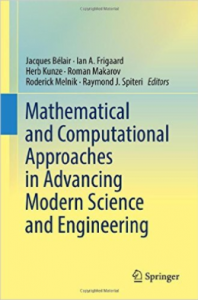 An erratum for a book chapter about water pollution has removed two out of the three original authors.
An erratum for a book chapter about water pollution has removed two out of the three original authors.
What’s more, the notice specifies that “any mistakes or omissions are the sole responsibility” of the remaining author, Michael Yodzis of the University of Guelph in Ontario, Canada.
This isn’t something we see every day, but one of the removed authors told us he believes the paper is scientifically valid — he just didn’t have anything to do with it. Yodzis told us he included the two authors by mistake, after believing he had corresponded with them about the paper, which was an extension of their previous work together.
Here’s the erratum, issued in December:
The updated online version of the original chapter can be found at DOI 10.1007/978-3-319-30379-6_32
The authorship of the present article has been revised so that Michael Yodzis is now listed as the only author, to make clear that Dr. Chris T. Bauch and Dr. Madhur Anand were not contributors to this publication. The present contribution is an extended and revised version of the publication ‘Coupling fishery dynamics, human health and social learning in amodel of fish-borne pollution exposure’ by M. Yodzis, C.T. Bauch and M. Anand, Sustainability Science 11, pp. 179-192 (2016).
The results are extended to include a more complete explanation of the model’s dependence on its initial conditions, and the sensitivity analysis is enlarged to study the influence of the ecological parameters on the model’s qualitative outcomes. Any mistakes or omissions are the sole responsibility of Michael Yodzis.
The original paper, “Examining the Role of Social Feedbacks and Misperception in a Model of Fish-Borne Pollution Illness,” was published in August, 2016.
The book chapter builds on from a 2015 study by the same three authors in Sustainability Science, as Yodzis told us:
The study was related to and quotes past work with Dr. Bauch and Dr. Anand. I thought that I had corresponded with them about this study, so I rather thoughtlessly listed them as co-authors. Later, when they asked why they were co-authors, I realized to my great [embarrassment] that I forgot to ever notify them of my study and manuscript. As I respect them as colleagues, my mistake was extremely disappointing to me.
Once they saw their names on the author list, Chris Bauch and Madhur Anand — also at the University of Guelph — both asked to be removed from the author list.
Bauch noted:
I did not contribute to the new material in the original paper, only the material that already appears in the 2015 paper in Sustainability Science by Yodzis et al.
He added that he believes the paper is scientifically sound, noting:
It provides an incremental advance over the previous study published in Sustainability Science in 2015, with respect to analyzing how model predictions depend on model parameters.
Anand also said that she wasn’t aware that she was listed as an author until after the study was published.
Yodzis said he made further changes to the paper to make it clear it was distinct from his previous collaboration with Anand and Bauch:
I introduced a footnote to emphasize that the new study is independent work that builds on our previous article in [Sustainability] Science. This helps reinforce that they are separate works with separate authorship.
Like Retraction Watch? Consider making a tax-deductible contribution to support our growth. You can also follow us on Twitter, like us on Facebook, add us to your RSS reader, sign up on our homepage for an email every time there’s a new post, or subscribe to our daily digest. Click here to review our Comments Policy. For a sneak peek at what we’re working on, click here.
Quote: “Yodzis told us he included the two authors by mistake, after believing he had corresponded with them about the paper, which was an extension of their previous work together.”
It’s rather strange to consider “corresponded with” constituting co-authorship. Maybe this author fears of being accused of plagarism. If so, he’s taking the footnote-everything madness into the even more insane realm of assigning co-authorship to everything. If a writer as brilliant as Shakespeare didn’t both to assign co-authorships, why should they:
http://www.shakespeare-online.com/sources/
I’m tempted to suggest that those doing research “get a life”—meaning have areas of their lives that remain apart from their scholarship. But the competition for grants, positions and tenure is so great, my suggestion would probably fall on deaf ears. It’s a bit like telling someone trapped in a burning building to calm down. ‘Publish or perish’ is increasing taken literally.
I often smile with gratitude when I recall that, as an engineering major, the professors who taught me math and science considered their primary job to be teaching, with research tacked on as an advocation. Indeed, for a time I thought of shifting my major to physics because because its professors so obviously enjoyed their research. I suspect many in today’s academia do not enjoy what they do.